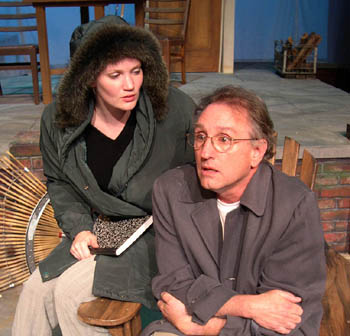![[Metroactive Stage]](/stage/gifs/stage468.gif)
[ Stage Index | Silicon Valley | Metroactive Home | Archives ]

Photograph by Holly Cornelison Lost in Thought: Catherine (Amy Cornelison) tries to get through to her mathematician father (Wiill Huddleston) in 'Proof.' Troubled Minds Emotional truths are computed in California Theatre Center's production of 'Proof' By Marianne Messina IN THE WORLD of mathematics, inchoate intuitive knowledge only becomes communicable (e.g. useful) when some individual with innate genius "connects the dots" in the form of a proof—at least that's how it goes in the David Auburn play Proof, currently running in repertory at California Theatre Center (along with The Tempest and A Walk in the Woods). Robert (Will Huddleston), a revered mathematics professor, and his daughter Catherine (Amy Cornelison) both have the genius for math. But Robert's "beautiful mind" breaks down in his later years, and Catherine interrupts her own formal studies to stay home and take care of him. As Robert, Huddleston resists the temptation to play "crazy" and instead gives us a Robert we want to comfort and cuddle, someone pleasantly childlike without seeming childish. Having her father's talent for math and a tendency toward depression, Catherine questions her own sanity, and this becomes the running question throughout the play. The destabilizing flashbacks Auburn has built into the structure of the play are disorienting enough to include the audience in the fabric of doubt. Is Catherine experiencing the same delusional fugues that characterized her father's mental state, or is she perfectly normal? Like everyone else in the play, we're looking for proof. In comes Catherine's sister, Claire, played by Amy's real-life sister, Holly Cornelison (and to complete the life-imitates-art family triangle, their real-life father, Gayle Cornelison, directs the play). Claire, who got only a tiny bit of the mathematical talent, has used it to create a fast-track life for herself in Manhattan. From Claire's perspective, Catherine is the one who needs to be taken care of. The chemistry between CTC's real-life sisters is a treat not often found in productions of this play. The Cornelisons' familial but discrete styles allow them to give the roles a complex subtlety. Holly can underplay Claire's jealousy, Amy can underplay Katy's resistance, yet somehow they still evoke a whole luggage rack of hidden history between them. Holly is matronly as the decisive and practical sister who sucked it up for a somewhat numb life that looks good on paper. Amy is tomboyish as the emotionally churning, slightly out-of-step sister who is more indecisive and impulsive. Holly Cornelison's portrayal of concerned sister Claire is quite sobering. "She's fragile," Claire says to Katy's love interest, Hal (Noel Wood), "and you took advantage." In that one stroke, Claire changes the nature of Hal and Katy's relationship. No longer are they seen as two responsible adults but as victimizer and victim. What's devastating about Holly's Claire is not how cold she is, but how warm, sincere and distraught she seems, throwing into question the tenuous line between concern and infringement. Noel Wood, with his locks of curly hair, wide smile and broad mimelike facial movements, is fairly buoyant as Hal, math-geek and former protégé of Robert's. The character of Hal forms an opening through which trust can enter the formula. The exchanges between Hal and Catherine are all about proof vs. trust, and Wood gives the character sincerity in spite of his vacillations. "It's just evidence; it doesn't prove anything," Catharine says to Hal at one point. "You should have trusted me." Set on a lazy back porch, the play is full of light tones and mathematical in-jokes, but in the undertones, it raises prickly issues around what holds our consensus reality together.
Proof, a California Theatre Center production, plays Wednesday-Thursday (July 14-15) and Saturday (July 24) at 8pm at the Sunnyvale Community Center Theatre, 550 E. Remington Dr., Sunnyvale. Tickets are $18-$25. (408.720.0873)
Send a letter to the editor about this story to letters@metronews.com. [ Silicon Valley | Metroactive Home | Archives ]
|
From the July 14-20, 2004 issue of Metro, Silicon Valley's Weekly Newspaper.
Copyright © Metro Publishing Inc. Metroactive is affiliated with the Boulevards Network.
For more information about the San Jose/Silicon Valley area, visit sanjose.com.